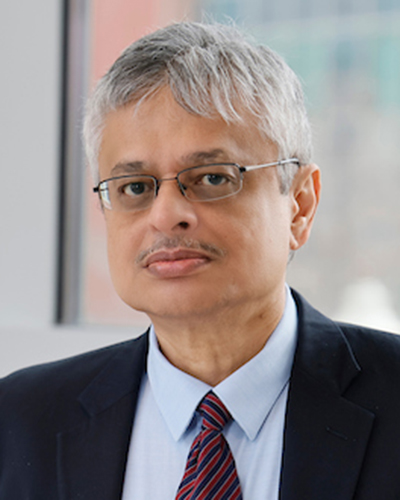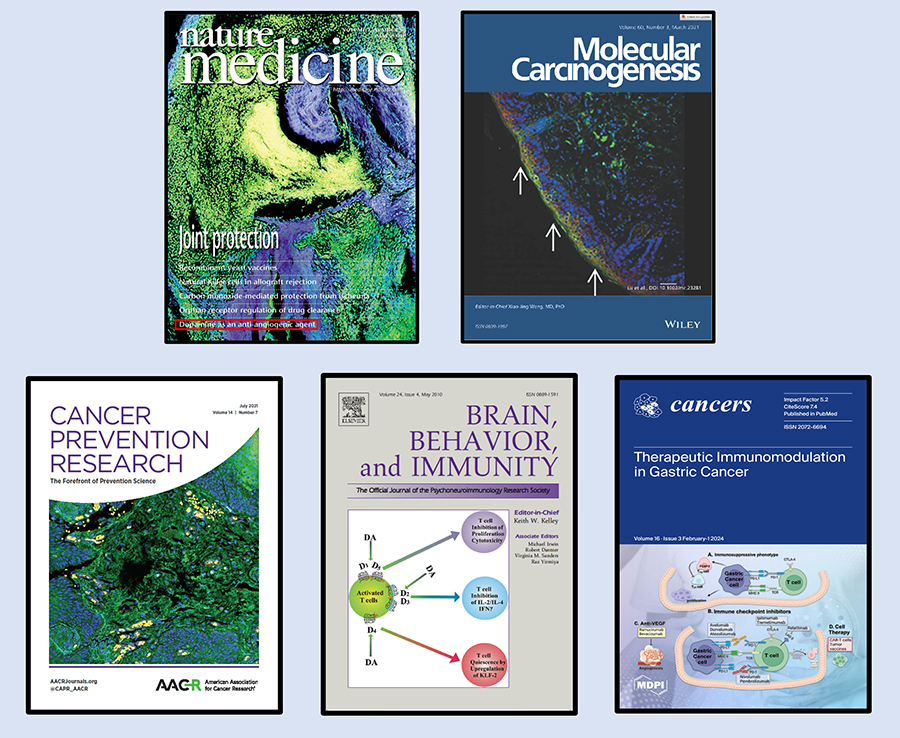Sujit Basu, MD, PhD
Professor

- Phone:
- 614-247-5414
- E-mail:
- Email Dr. Basu
- Office Location:
- 250 Evans Hall
- 520 King Avenue
- Columbus, OH 43201
Biosketch
Sujit Basu, MD, Ph.D. is a Professor in the Department of Pathology and Division of Medical Oncology (Internal Medicine). Dr. Basu received his medical degree and Ph.D. from the University of Calcutta, India, and trained as a medical oncologist. He completed his postdoctoral research work in the Department of Molecular Genetics at the University of Illinois at Chicago and Department of Pathology, Beth Israel Deaconess Medical Center, Harvard Medical School in Boston. He further undertook clinical training in Nephrology at Boston Children’s Hospital, Internal Medicine including Divisions of Gastroenterology, Hepatology and Nutrition and Medical Oncology at Beth Israel Deaconess Medical Center, Harvard Medical School. Dr. Basu was an Assistant Professor at Mayo Clinic (Rochester) before joining Ohio State University in 2008. Dr. Basu’s research primarily focuses on studying cancer biology (tumor microenvironment, experimental therapeutics and neural regulation of tumorigenesis), angiogenesis, vasculogenesis, and immunity (neural-immune interactions).
Grants
Dr. Basu's research is supported by grants from the National Institute of Health, DOD and Research Foundations.
Academic and Medical Appointments
2013-Present Professor of Pathology and Medical Oncology (Internal Medicine), The Ohio State University Medical Center, Columbus, OH
2017-Present Director of Translational Research
2021-Present Jack C. Geer M.D. Endowed Professor
Education and Training
1996 M.D., Ph.D. (Medicine/Cancer Research)
Selected Publications

- Akkanapally V, Bai X.-F, Basu S. Therapeutic Immunomodulation in Gastric Cancer. Cancers 16, 560, 2024 https://doi.org/10.3390/ cancers16030560 (Featured Cover Page and Editor’s Choice article).
- Chakroborty D, Goswami S, Fan H, Frankel WL, Basu S, Sarkar C. Neuropeptide Y, a paracrine factor secreted by cancer cells, is an independent regulator of angiogenesis in colon cancer. Br J Cancer 127:1440-1449, 2022
- Sarkar C, Chakroborty D, Goswami S, Fan H, Mo X, Basu S. VEGF-A controls the expression of its regulator of angiogenic functions, dopamine D2 receptor, on endothelial cells. J Cell Sci. 2022 Jun 1;135(11):jcs259617. doi: 10.1242/jcs.259617.
- Lu K, Bhat M, Peters S, Mitra R, Mo X, Oberyszyn TM, Dasgupta PS, Basu S. Dopamine Prevents Ultraviolet B-induced Development and Progression of Premalignant Cutaneous Lesions through its D2 Receptors. Cancer Prev Res (Phila) 14: 687-696, 2021 (Featured Cover Image, Highlighted article and Editor’s pick).
- Lu K, Bhat M, Peters S, Mitra R, Oberyszyn T, Basu S. Suppression of beta 2 adrenergic receptor actions prevent UVB mediated cutaneous squamous cell tumorigenesis through inhibition of VEGF‐A induced angiogenesis. Molecular Carcinogenesis 60:172-178, 2021 (Featured Cover Image; Top Cited Article 2021-2022 in the journal informed by the publisher Wiley).
- Lu K, Iwenofu OH, Mitra R, Mo X, Dasgupta PS, Basu S. Chebulinic acid is a safe and effective antiangiogenic agent in collagen-induced arthritis in mice. Arthritis Res Ther 22:273, 2020.
- Roy S, Lu K, Nayak MK, Bhuniya A, Ghosh T, Kundu S, Ghosh S, Baral R, Dasgupta PS, Basu S. Activation of D2 Dopamine Receptors in CD133+ve Cancer Stem Cells in Non-small Cell Lung Carcinoma Inhibits Proliferation, Clonogenic Ability, and Invasiveness of These Cells. J Biol Chem 292:435-445, 2017.
- Chakroborty D, Sarkar C, Lu K, Bhat M, Dasgupta PS, Basu S. Activation of Dopamine D1 receptors in Dermal Fibroblasts Restores VEGF-A Production by These Cells and Subsequent Angiogenesis in Diabetic Cutaneous Wound Tissues. Am J Pathol 186: 2260-2272, 2016.
- Lu K, Basu S. The natural compound chebulagic acid inhibits vascular endothelial growth factor A mediated regulation of endothelial cell functions. Sci Rep 2015 Apr 10; 5:9642.
- Sarkar C, Chakroborty D, Dasgupta PS, Basu S. Dopamine is a safe antiangiogenic drug which can also prevent 5-fluorouracil induced neutropenia. Int J Cancer 137:744-749, 2015.
- Lu K, Chakroborty D, Sarkar C, Lu T, Xie Z, Liu Z, Basu S, Triphala and its active constituent chebulinic acid are natural inhibitors of vascular endothelial growth factor - A mediated angiogenesis. PLos One 8: e43934, 2012 (Press Tweet by Plos One, News in Nature Website).
- Shome S, Dasgupta PS, Basu S. Dopamine regulates mobilization of mesenchymal stem cells during wound angiogenesis. PLoS One 7: e31682, 2012 (Recommended by Faculty1000 Prime).
- Chakroborty D, Sarkar C, Yu H, Wang J, Liu Z, Dasgupta PS, Basu S. Dopamine stabilizes tumor blood vessels by up-regulating angiopoietin 1 expression in pericytes and Kruppel-like factor-2 expression in tumor endothelial cells. Proc Natl Acad Sci U S A 108:20730-20735, 2011.(News in Nature Website)
- Shome S, Rana T, Ganguly S, Basu B, Chaki Choudhury S, Sarkar C, Chakroborty D, Dasgupta PS, Basu S. Dopamine regulates angiogenesis in normal dermal wound tissues. PLoS One 6:e25215, 2011.(News in Nature Website)
- Ganguly S, Basu B, Shome S, Jadhav T, Roy S, Majumdar J, Dasgupta PS, Basu S. Dopamine, by acting through its D2 receptor, inhibits insulin-like growth factor-I (IGF-I) - induced gastric cancer cell proliferation via up-regulation of Krüppel-like factor 4 through down-regulation of IGF-IR and AKT phosphorylation. Am J Pathol 177:2701-2707, 2010.
- Chakroborty D, Chowdhury UR, Sarkar C, Baral R, Dasgupta PS, Basu S. Dopamine regulates endothelial progenitor cell mobilization from mouse bone marrow in tumor vascularization. J Clin Invest 118:1380-1389, 2008 (Editor’s Highlighted Article, News in Nature Website)
- Sarkar C, Chakroborty D, Chowdhury UR, Dasgupta PS, Basu S. Dopamine increases the efficacy of anticancer drugs in breast and colon cancer preclinical models. Clin Cancer Res 14:2502-2510, 2008.
- Chakroborty D, Sarkar C, Mitra RB, Banerjee S, Dasgupta PS, Basu S. Depleted dopamine in gastric cancer tissues: dopamine treatment retards growth of gastric cancer by inhibiting angiogenesis. Clin Cancer Res 10:4349-4356, 2004 (Featured Article).
- Basu S, Nagy JA, Pal S, Vasile E, Eckelhoefer IA, Bliss VS, Manseau EJ, Dasgupta PS, Dvorak HF, Mukhopadhyay D. The neurotransmitter dopamine inhibits angiogenesis induced by vascular permeability factor/vascular endothelial growth factor. Nat Med 7:569-574, 2001 (Mentioned on the Cover Page).
